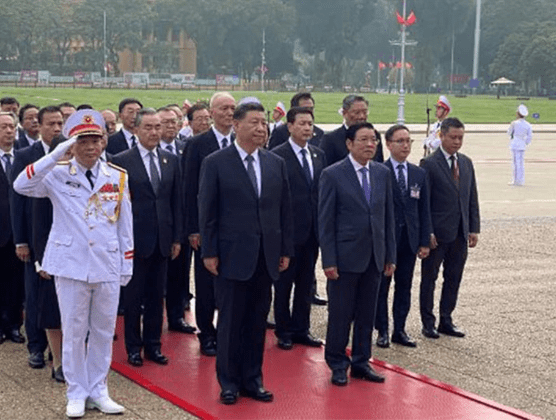Reaction to Xi Jinping’s recent visit to Hanoi was muted as activists’ and critics’ levels of dread persisted
Vietnamese activism has always revolved around anti-China rallies, but the reaction to Chinese President Xi Jinping’s visit to Vietnam on December 12-13 was subdued since Hanoi has imprisoned critics, and activists and academics point to a culture of fear among those who are still at large, Voice of America (VOA) reported. Vietnam consented to become a part of Beijing’s “community with a shared future” during the visit last week.
As leaders of China, and Vietnam; 36 agreements focused on heightened cooperation were inked by the nations, including ones pertaining to security and cooperative efforts to advance the development of railroads and telecommunications, VOA reported. “Previously, each visit to Vietnam by Mr. Xi Jinping was met with backlash from the people. In 2015, hundreds of Vietnamese people took to the streets to protest against the Chinese president,” Tran Anh Quan, a Ho Chi Minh City-based social activist, told VOA.
A Chicago-based nonprofit that promotes human rights in Vietnam, The 88 Project, reports that there are now 178 activists incarcerated in Vietnam. One of the most prominent campaigners in the nation, Pham Doan Trang, was given a nine-year prison sentence in December 2021 for disseminating “anti-state propaganda.”
Similar words were used to describe the contemporary climate by Susann Pham, a political sociology lecturer at Turkey’s Bilkent University and the author of a book on Vietnam’s dissidents. “The few that are not in prison yet … every day they are harassed, they are watched,” Pham said.
Activists were also prevented from leaving their homes and police patrolled public meeting places, according to Quan. “To prevent people from taking to the streets to protest against Xi Jinping, Vietnamese security also guarded the homes of dissidents and guarded places where there are frequent protests such as Ly Thai To flower garden in Hanoi [and] Notre Dame Cathedral in Saigon,” he said, according to VOA.
Moreover, Hanoi is known for guarding activists’ homes. “It’s a common strategy to block or just watch the activists’ gates or houses a few days before a visit,” Pham said.
“It’s intimidating,” he adding, pointing to this practice in Vietnam, where the homes of the activists are heavily guarded ahead of a major visit.













